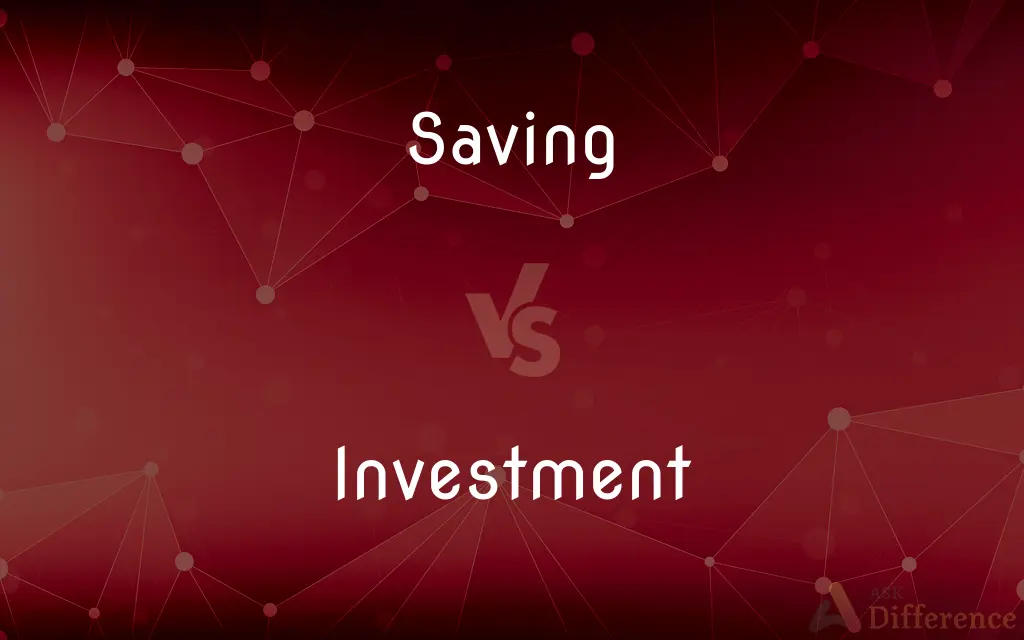Saving vs. Investment — What's the Difference?
By Urooj Arif & Fiza Rafique — Published on December 1, 2024
Saving is setting aside money for future use with minimal risk, offering ready access but lower returns. Investment involves allocating money into assets like stocks or real estate, aiming for higher returns through greater risk and longer commitment.

Difference Between Saving and Investment
Table of Contents
ADVERTISEMENT
Key Differences
Saving typically refers to putting money into secure places like savings accounts, where it is accessible and earns a modest interest rate. This approach is preferred for short-term financial goals or emergency funds, emphasizing safety and liquidity. On the other hand, investing involves purchasing assets such as stocks, bonds, or real estate, with the expectation of capital appreciation, dividends, or rental income. Investments are suited for long-term goals due to their potential for higher returns, accompanied by higher risks.
While savings are generally insured up to a certain amount by government-backed agencies (e.g., FDIC in the USA), offering a safety net against bank failures, investments are not guaranteed and can fluctuate in value. Therefore, investments carry the risk of partial or total loss of the initial capital, whereas savings offer a stable, though lower, growth.
The return on savings is typically lower, reflecting their safety and liquidity. Interest rates on savings accounts are often below the rate of inflation, which can erode the purchasing power of saved money over time. In contrast, investments can significantly outpace inflation, increasing wealth in real terms, but this comes with the uncertainty of market movements and economic conditions.
Savings are ideal for those who need quick access to their funds without worrying about market volatility. This makes saving a crucial part of personal financial stability. Investing, however, requires a willingness to accept risk and the patience to wait for potentially higher returns over a longer period, which is crucial for achieving substantial financial growth and retirement planning.
Decision-making in saving vs. investing also differs; savings decisions are relatively straightforward, focusing on how much to save and where to keep the funds. Investing, however, requires research, strategy, and ongoing management, considering factors like market trends, asset allocation, and risk tolerance.
ADVERTISEMENT
Comparison Chart
Purpose
Short-term goals, emergency funds
Long-term financial growth, retirement
Risk
Low, with principal protection
Higher, with potential for loss
Returns
Lower, often below inflation
Higher, can significantly outpace inflation
Accessibility
High, with immediate access to funds
Lower, often requires time for significant appreciation
Government Insurance
Often insured up to a limit
Not typically insured
Decision-making
Straightforward (amount, where to save)
Requires research and management (market trends, risk)
Typical Instruments
Savings accounts, CDs
Stocks, bonds, real estate
Compare with Definitions
Saving
Storing money for future use with minimal risk.
She opened a savings account for her emergency fund.
Investment
Involves purchasing assets like real estate for potential income.
They bought a rental property as a long-term investment.
Saving
Earning interest on deposited money without risking the principal.
Their savings account offered a 1% annual interest rate.
Investment
Can lead to substantial returns through capital appreciation.
Her investment portfolio doubled in value over ten years.
Saving
A secure, accessible way to manage short-term financial needs.
They used their savings for a down payment on a car.
Investment
Requires accepting varying levels of risk and market volatility.
He diversified his investments to manage risk.
Saving
Offers stability and peace of mind, but lower growth potential.
Saving provided her with security, albeit with modest returns.
Investment
A strategy for building wealth and funding future financial goals.
They invested regularly for their retirement.
Saving
Essential for financial emergencies and unforeseen expenses.
He tapped into his savings when he lost his job.
Investment
The act of investing.
Saving
A reduction in expenditure or cost.
Investment
An amount invested.
Saving
Savings (used with a sing. verb) Usage Problem An amount of money saved
A rebate that yielded a savings of $50.
Investment
Property or another possession acquired for future financial return or benefit.
Saving
Bringing back in returns or in receipts the sum expended; incurring no loss, though not gainful.
A saving bargain
The ship has made a saving voyage.
Investment
(finance) A placement of capital in expectation of deriving income or profit from its use or appreciation.
Saving
Bringing back in returns or in receipts the sum expended; incurring no loss, though not gainful; as, a saving bargain; the ship has made a saving voyage.
Investment
The laying out of money in the purchase of some species of property; also, the amount of money invested, or that in which money is invested.
Before the investment could be made, a change of the market might render it ineligible.
An investment in ink, paper, and steel pens.
Saving
Something kept from being expended or lost; that which is saved or laid up; as, the savings of years of economy.
Investment
The act of investing; laying out money or capital in an enterprise with the expectation of profit
Investment
Allocating resources with the expectation of achieving a profit.
He invested in stocks to grow his wealth.
Common Curiosities
Is it possible to lose all money in an investment?
Yes, certain investments can lead to a total loss, emphasizing the importance of risk management and diversification.
What is the main difference between saving and investing?
Saving focuses on preserving money with low risk, while investing aims for higher returns through higher risk.
Should I have an emergency fund before investing?
Yes, it's wise to have savings for emergencies to avoid liquidating investments prematurely in a crisis.
Can savings accounts lose money?
Savings accounts themselves don't lose money due to market fluctuations, but inflation can reduce their purchasing power.
What are the tax implications of saving vs. investing?
Interest from savings can be taxable, while investments may incur capital gains tax or offer tax advantages, depending on the asset.
Are investments insured?
Investments like stocks and bonds are not insured against losses, unlike savings accounts which are often insured up to a certain limit.
How do I choose between saving and investing?
Consider your financial goals, risk tolerance, and time horizon. Saving is better for short-term needs, while investing is suited for long-term growth.
Do I need a lot of money to start investing?
No, many platforms allow for small initial investments, making it accessible to begin with modest amounts.
How quickly can I access my investments?
Access times vary by asset type; some can be sold quickly, while others, like real estate, may require more time to liquidate.
How does inflation affect saving and investing?
Inflation erodes the value of money saved with low interest, whereas investments have the potential to outpace inflation.
How do I start investing?
Begin by researching, setting clear goals, and possibly consulting a financial advisor.
What's a safe investment with a decent return?
"Safe" investments like bonds or index funds offer lower risk, but returns vary by economic conditions.
How often should I review my investment portfolio?
Regular reviews, at least annually or after major life changes, help adjust strategies to stay on track with financial goals.
Can I mix saving and investing?
Absolutely, a balanced approach can address both short-term needs and long-term goals.
Why is diversification important in investing?
Diversification spreads risk across various assets, reducing the impact of any single investment's poor performance.
Share Your Discovery

Previous Comparison
Confederate Constitution vs. Union Constitution
Next Comparison
Radial Tire vs. Tubeless TireAuthor Spotlight
Written by
Urooj ArifUrooj is a skilled content writer at Ask Difference, known for her exceptional ability to simplify complex topics into engaging and informative content. With a passion for research and a flair for clear, concise writing, she consistently delivers articles that resonate with our diverse audience.
Co-written by
Fiza RafiqueFiza Rafique is a skilled content writer at AskDifference.com, where she meticulously refines and enhances written pieces. Drawing from her vast editorial expertise, Fiza ensures clarity, accuracy, and precision in every article. Passionate about language, she continually seeks to elevate the quality of content for readers worldwide.













































